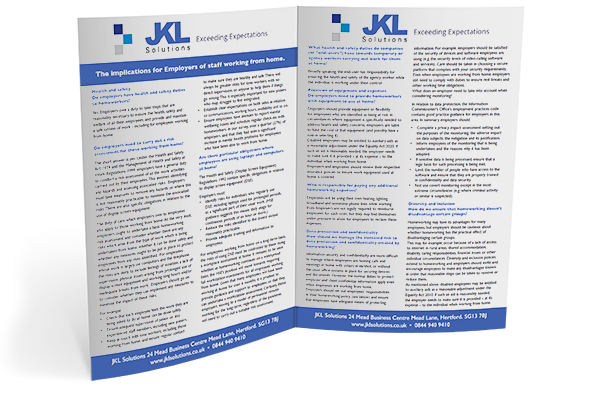The implications for Employers of staff working from home
Health and safety
Do employers have health and safety duties to homeworkers?
Yes. Employers owe a duty to take steps that are reasonably necessary to ensure the health, safety and welfare of all their employees, and provide and maintain a safe system of work - including for employees working from home.
Do employers need to carry out a risk assessment for those working from home?
The short answer is yes. Under the Health and Safety Act 1974 and the Management of Health and Safety at Work Regulations 1999, employers have a general duty to conduct a risk assessment of all the work activities carried out by their employees. This involves identifying any hazards and assessing associated risks. Employers must take measures to remove any hazards or, where this is not reasonably practicable, to minimise the associated risks. There are also specific obligations in relation to the use of display screen equipment
The duty of care which employers owe to employees also apply to those working from home. At the very least, employers ought to undertake a basic homeworking risk assessment and consider whether there are any risks which arise from the type of work which is being undertaken from home, whether it can be done safely and whether any measures ought to be put in place to protect employees from any risks identified. For employees whose work is largely on computers and the telephone the risks are likely to include feelings of isolation, a lack of supervision, physical issues arising from prolonged use of display screen equipment and working long hours and/or inadequate breaks from work. Employers should go on to consider whether they can implement any measures to minimise the impact of these risks.
For example:
- Check that each employee feels the work they are being asked to do at home can be done safely.
- Ensure adequate supervision of junior or less experienced staff members, including new joiners.
- Keep in touch with lone workers, including those working from home, and ensure regular contact to make sure they are healthy and safe. There will always be greater risks for lone workers with no direct supervision, or anyone to help them if things go wrong. This is especially important for new joiners who may struggle to feel integrated.
- Establish clear expectations on both sides in relation to communications, working hours, availability and so on.
- Ensure employees have avenues to report mental wellbeing issues and schedule regular check-ins with homeworkers. In our survey, over a quarter (27%) of employers said that they had seen a significant increase in mental health problems for employeeswho have been able to work from home.
Are there particular obligations where employees are using laptops and computers at home?
The Health and Safety (Display Screen Equipment) Regulations 1992 contain specific obligations in relation to display screen equipment (DSE).
Employers must:
- Identify risks for individuals who regularly use DSE, including laptops used for prolonged periods, as a significant part of their usual work. (HSE guidance suggests this means daily usage for continuous periods of an hour or more.)
- Reduce the risks identified to the lowest extent reasonably practicable.
- Provide adequate training and information to employees.
For employees working from home on a long-term basis, the risks of using DSE must be controlled by them doing a workplace assessment at home. It remains to be seen whether, as homeworking continues on a widespread basis, the HSE’s position will move towards requiring full workstation assessments for all employees working from home. Given that many employees will have been working at home for over 6 months, it is prudent to provide guidance and support to employees so that they can undertake a workstation assessment. Certainly, those employers moving to a model of permanent remote working for the long-term, regardless of the pandemic, will need to carry out a suitable risk assessment.
What health and safety duties do companies (or “end-users”) have towards temporary or agency workers carrying out work for them at home?
Broadly speaking, the end-user has responsibility for ensuring the health and safety of the agency worker while the individual is working under their control.
Provision of equipment and expenses.
Do employers need to provide homeworkers with equipment to use at home?
Employers should provide equipment or flexibility for employees who are identified as being at risk. In circumstances where equipment is specifically needed to address health and safety concerns, employers are liable to fund the cost of that equipment (and possibly have a role in selecting it).
Disabled employees may be entitled to auxiliary aids as a reasonable adjustment under the Equality Act 2020. If such an aid is reasonably needed, the employer needs to make sure it is provided – at its expense – to the individual when working from home.
Employers and employees should review their respective insurance policies to ensure work equipment used at home is covered.
Who is responsible for paying any additional homeworking expenses?
Employees will be using their own heating, lighting, broadband and sometime phone lines while working from. Employers are not legally required to reimburse employees for such costs, but they may find themselves under pressure to allow for employees to reclaim these expenses.
Data protection and confidentiality
How should we manage the increased risk to data protection and confidentiality created by homeworking?
Information security and confidentiality are more difficult to manage where employees are hosting calls and meetings at home with others in earshot, or without the usual office systems in place for securing devices and documents. However, the normal duties to protect employer and client confidential information apply even when employees are working from home.
Employers should set out employees’ responsibilities in their homeworking policy (see below) and ensure that employees have adequate means of protecting information. For example, employers should be satisfied of the security of devices and software employees are using (e.g. the security levels of video-calling software and services). Care should be taken in choosing a secure platform that complies with your security requirements. Even when employees are working from home, employers still need to comply with duties to ensure rest breaks and other working time obligations.
What does an employer need to take into account when considering monitoring?
In relation to data protection, the Information Commissioner’s Office’s employment practices code contains good practice guidance for employers in this area. In summary, employers should:
- Complete a privacy impact assessment setting out the purposes of the monitoring, the adverse impact on data subjects, the mitigation and its justification.
- Inform employees of the monitoring that is being undertaken, and the reasons why it has been adopted.
- If sensitive data is being processed, ensure that a legal basis for such processing is being met.
- Limit the number of people who have access to the software and ensure that they are properly trained in confidentiality and data security.
- Not use covert monitoring except in the most extreme circumstances (e.g. where criminal activity or similar is suspected).
Diversity and inclusion
How do we ensure that homeworking doesn’t disadvantage certain groups?
Homeworking may have its advantages for many employees, but employers should be cautious about whether homeworking has the practical effect of disadvantaging certain groups.
This may, for example, occur because of a lack of access to internet in rural areas, shared accommodation, disability, caring responsibilities, financial issues or other individual circumstances. Diversity and inclusion policies extend to homeworking and employers should invite and encourage employees to make any disadvantages known in order that reasonable steps can be taken to remove or reduce them.
As mentioned above, disabled employees may be entitled to auxiliary aids as a reasonable adjustment under the Equality Act 2010. If such an aid is reasonably needed, the employer needs to make sure it is provided – at its expense – to the individual when working from home.
If you want to talk to some regarding any points raised within this article, or you are looking for help to make sure your staff are set up correctly, then please give our consultants a call on 0844 940 9410.








